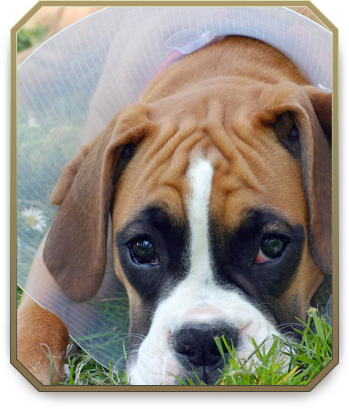Your Pet's Surgery at Slidell Veterinary Hospital
 The veterinarians and entire staff at Slidell Veterinary Hospital understand that the decision to allow your companion to undergo surgery is never an easy one. We strive to ensure your pet's procedure is as comfortable and stress-free as possible.
The veterinarians and entire staff at Slidell Veterinary Hospital understand that the decision to allow your companion to undergo surgery is never an easy one. We strive to ensure your pet's procedure is as comfortable and stress-free as possible.
Perhaps the most important pre-surgical step is to discuss why we believe a particular procedure is necessary and what it entails. Our veterinarians will provide you with information on proper postoperative care and answer any questions you may have so that you feel comfortable knowing you are making the right choice for your pet.
Surgical Procedures
We regularly perform many types of surgeries, including but not limited to:
|
Soft Tissue Surgeries
Orthopedic Surgeries
|
Special Surgeries
|
Anesthesia
Ensuring the health, safety, and comfort of your pet during surgery is our utmost concern and requires an anesthetic and monitoring regimen that adheres to the highest principles and ideals of quality care.
Prior to surgery, your pet receives a thorough exam by the veterinary surgeon and pre-surgical blood tests are performed. The results of these tests and your pet's past anesthetic history, breed, pre-existing conditions, and age are used to create an individualized anesthesia protocol for your pet.
 We begin most general anesthetic procedures by administering a sedative to help your pet relax. To maintain sedation, we deliver a gas anesthetic in combination with oxygen through a breathing tube.
We begin most general anesthetic procedures by administering a sedative to help your pet relax. To maintain sedation, we deliver a gas anesthetic in combination with oxygen through a breathing tube.
During anesthesia, your pet is cared for by a well-trained and experienced veterinary technician using our monitoring system which tracks blood pressure, heart rate, respiratory rate, body temperature, and oxygen level.
Pain Management and Post Operative Care
We all know that pain hurts, but pain also has many other detrimental effects on your pet's body. Pain slows healing, decreases activity, and causes behavioral changes such as aggression, anxiety, and depression. Pain also worsens diseases like arthritis and some cancers. It interferes with the bond between you and your pet.
At Slidell Veterinary Hospital, we practice the most up-to-date pain management protocol. For acute and chronic conditions, we use all our available and safe resources, including NSAIDs (non-steroidal medications) and narcotic pain relievers for the complete comfort of your pet.
As your pet is being discharged from the hospital, you will be provided with detailed information on how to properly care for your pet at home after surgery. We are also happy to answer any questions or concerns that may arise once you get your pet home.
For more information about our surgical services, please email or call us at (985) 643-4822. We are always happy to answer any questions you may have.